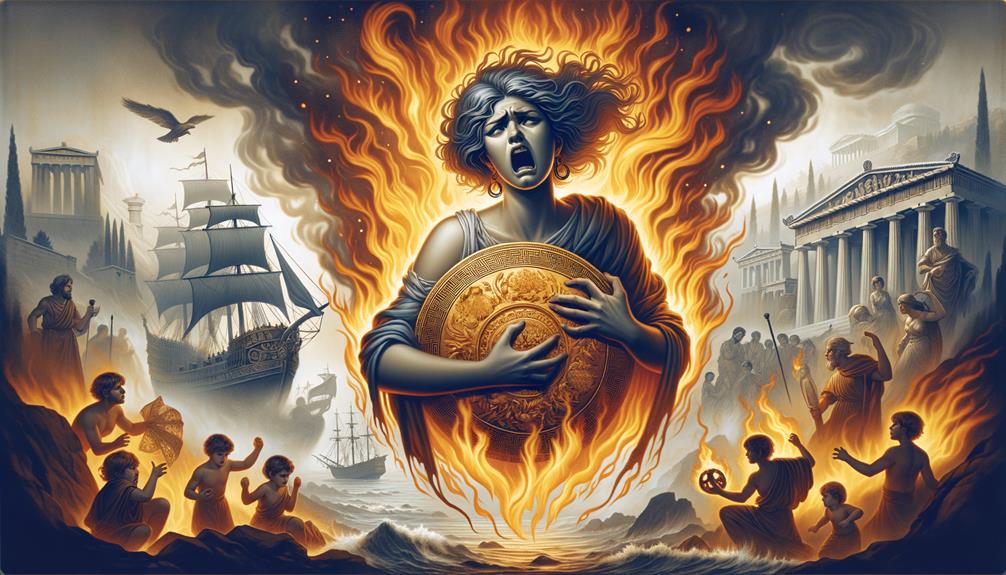Have you ever experienced the heartbreak of betrayal? The story of 'The Tragedy of Medea' provides a soul-stirring narrative of love's treachery, the allure of magic, and the icy grasp of revenge. I've walked in the shoes of Medea, a princess who also happens to be an enchantress. She shifts from being an expressive lover of Jason to a furious orchestrator of revenge, crushed by her husband's dishonesty. The way the sea's tides rise and fall in her life is reflected in her stormy decisions. The flames of her retribution reflect in her unquenchable desire for payback. Her actions are as intense as a blade's edge – sharp and merciless. If you stick with this mythological tale, you'll see the frightening depths Medea's vengeance takes her.
Medeas Character Analysis
If we consider the character of Medea, we find a potent mix of magic, treachery, envy, and vengeance defining her story. She's a princess from Colchis who marries Jason, a renowned hero. However, her life spirals into tragedy when Jason forsakes her for another woman. Overwhelmed by envy and anger, she seeks justice through extreme measures. Her method of revenge is not commonplace; it involves the unthinkable act of murdering her own children. This horrifying deed, intended to inflict the deepest hurt on Jason, muddies the waters of morality. Medea, a multifaceted character, provokes us to question our conventional understanding of right and wrong, as well as our capacity for empathy. She isn't just a representation of revenge but an illustration of the chaos that treachery can cause, even in the most virtuous hearts.
Themes and Symbols
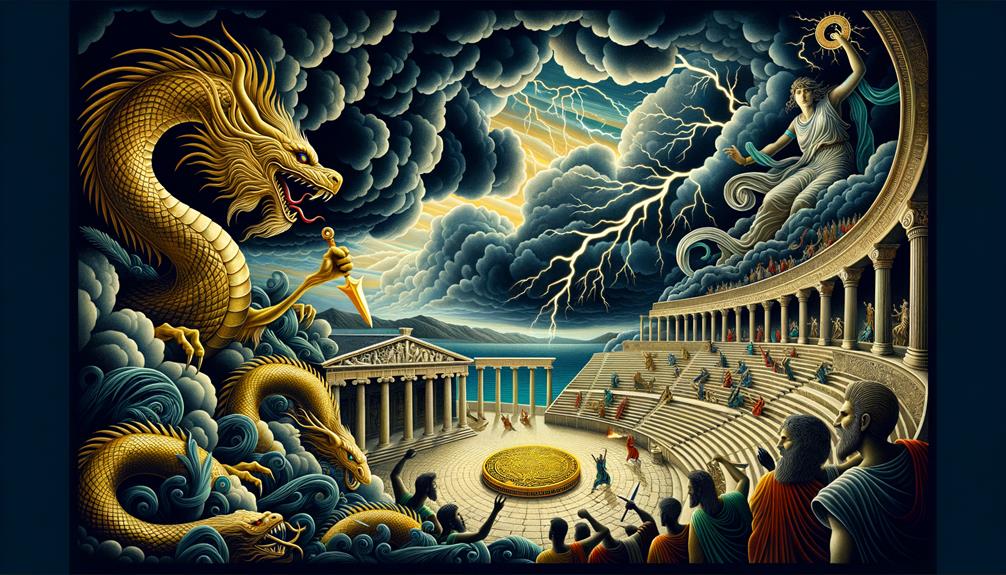
Let's take a closer look at the symbolic aspects of Medea's story. It's hard not to notice her transformation into a living curse, which perfectly illustrates the play's main theme of vengeance and payback. Each symbol is like a snapshot of Medea's struggle and the tragedy that unfolded when Jason and Medea's relationship crumbled due to deceit.
- The sea, with its unpredictable waves, is like a reflection of the ups and downs in Medea's life and the tough decisions she had to make.
- Fire, spreading without any control, is a mirror image of Medea's strong desire to exact revenge and her willingness to burn down everything that comes her way.
- Medea's readiness to resort to violence, her resolve to seek payback, is symbolized by the sharp edge of a sword.
- The wedding feast symbolizes the ultimate act of betrayal, marking the downfall of Jason and the disastrous outcomes of his deeds.
These symbols, tied together with the play's themes, add depth to the narrative, making the tragedy of Medea even more touching.
Role of Revenge in Medea
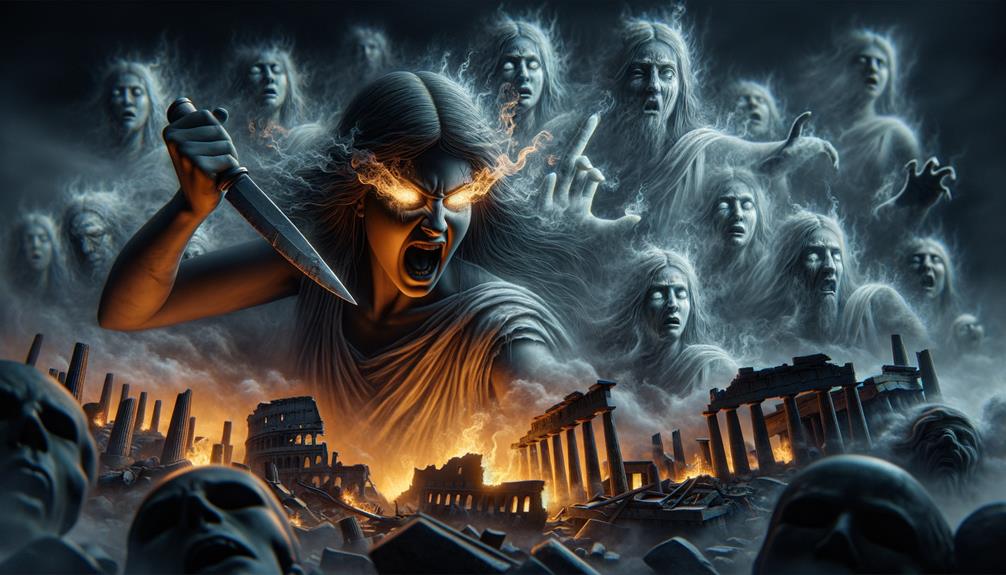
Let's take a closer look at how vengeance takes center stage in Medea, shaping the narrative and forcing the titular character into a cycle of tragic reprisal. The story revolves around Medea, who is hell-bent on getting back at her husband, Jason. This obsession with revenge takes over her, pushing her to unthinkable extremes against Jason. The fallout is catastrophic, with her revenge culminating in the horrific killing of her own offspring. This stark portrayal of vengeance not only highlights its transformative nature but also how it can distort the distinction between right and wrong. It's Medea's unrelenting quest for payback that lays bare the tragic fallout of wrath and betrayal, leaving us to grapple with the intricacies of justice.
Moral Complexity in Medea
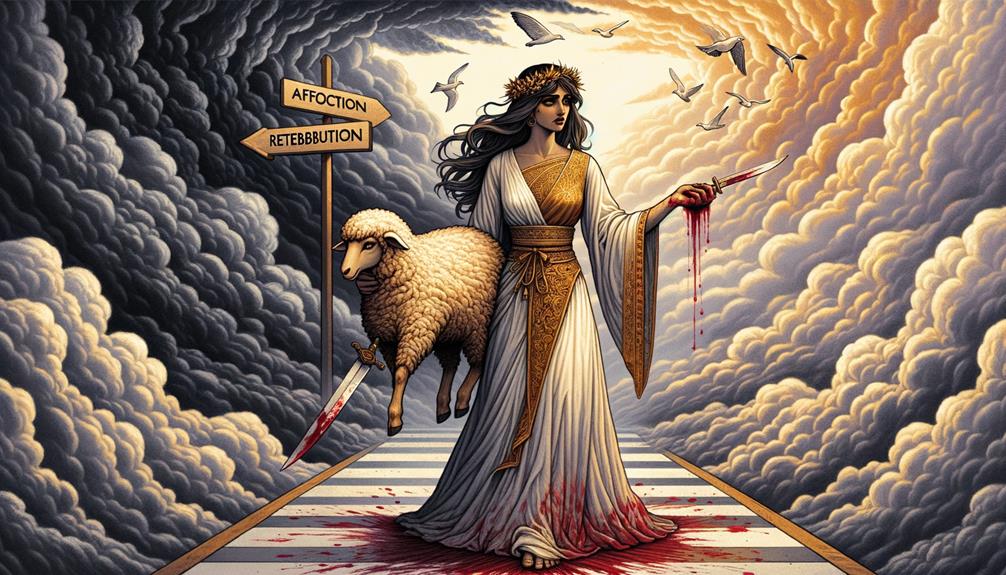
Diving into the moral complexity in Medea is like being sucked into an emotional vortex. We see her torn between the primal love she has for her children and her overwhelming need for retribution. Even though her actions are shocking to us, they stem from a deep sense of betrayal and unfairness.
- Medea's love for her kids is eclipsed by her thirst for revenge.
- Her choice to kill her own children shows just how far she'll go for vengeance.
- This forces us to think about what justice really is and how far morality extends.
- Even with her monstrous actions, we can't help but feel sympathy for Medea because her grief and anger is so raw and real.
We're left wondering if Medea was right to take revenge, and where we draw the line between right and wrong when faced with the pain of a brutal betrayal.
Understanding Medeas Tragedy
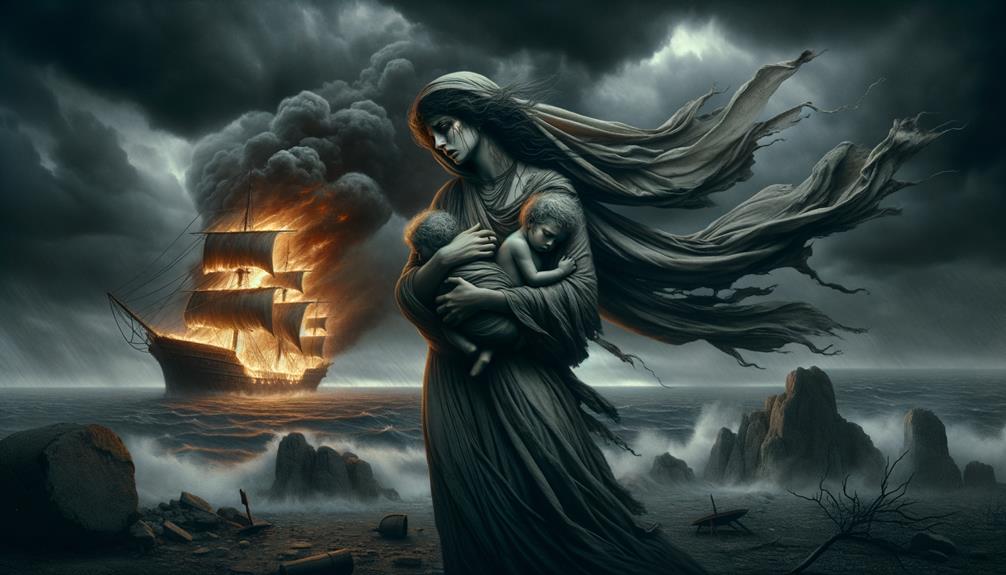
The crux of Medea's tragic tale revolves around a woman heartbroken by her husband's deceit. Jason, her husband, decides to wed the daughter of King Creon, leaving Medea emotionally devastated. This betrayal, as profound as the deepest ocean, sparks a vengeful fury within her. It's a fire that engulfs her completely.
Her once shining love for her children is now overshadowed by her quest for revenge. Through his narrative, Euripides brilliantly portrays Medea as a woman overpowered by her own anger, with her human essence getting lost in the maze of reprisal.
Her most horrifying act, killing her own children and the Corinthian princess, is a testament to her torment. Therefore, Medea's tragedy is a story of love deceived, vengeance pursued, and a life permanently scarred.
Frequently Asked Questions
What Makes Medea a Tragedy?
So, why do we call Medea a tragedy? Well, it's all about delving into the dark side of love, facing the harsh realities of injustice, and confronting the ugliness of revenge. Medea, the main character, is intensely emotional and her actions, as gruesome as they are, lead to her own downfall. It's a sobering reminder of what can happen when feelings run high and moral lines get blurry. Scary, isn't it?
What Is the Story of Medea About?
So, you're curious about the story of Medea, right? Well, it's all about a woman scorned. Medea, once married to Jason, finds herself betrayed and left behind by her unfaithful spouse. The sting of this betrayal is so deep, so personal, that Medea's anger becomes a force of its own. It leads her to commit acts so horrific, it's hard to believe. Her aim? To cause Jason the greatest pain possible. Now that's a story that really makes you feel something, doesn't it?
What Is the Main Message of Medea?
So, if I were to chat about the main message of Medea, I'd say it's like a big, flashing neon sign warning us about letting our emotions, especially jealousy, run wild. It hints at how that can steer us towards making some pretty damaging decisions with harsh outcomes. Essentially, it's a tale that warns us how revenge can totally overwhelm our better judgment.
What Were the Bad Things Medea Did?
Honestly, the things Medea did were pretty shocking. She didn't just kill a princess from Corinth named Glauce, she also murdered her own kids. Why, you ask? She was angry and wanted revenge. It's quite disturbing to see how far she was willing to go.

